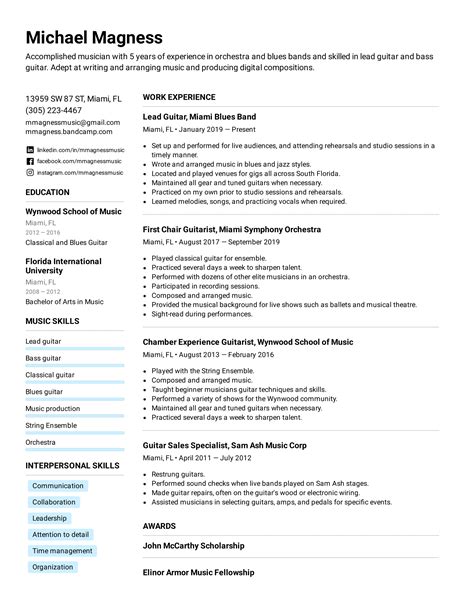The world of music is a highly competitive field, and as a college student, having a strong music resume can make all the difference in landing auditions, gigs, and even scholarships. Whether you're a seasoned musician or just starting out, having a professional music resume can help you stand out from the crowd and showcase your skills and experience.
In this article, we'll explore the top 5 tips for creating a strong music resume for college, including how to highlight your musical experience, education, and skills.
Tip #1: Tailor Your Resume to the Job or Audition

When creating a music resume, it's essential to tailor it to the specific job or audition you're applying for. This means highlighting the skills and experience that are most relevant to the position. For example, if you're applying for a spot in a college jazz band, you'll want to highlight your experience playing jazz, as well as any relevant skills such as improvisation or sight-reading.
Make sure to read the job description or audition requirements carefully and use keywords from the description in your resume. This will help your resume pass through applicant tracking systems (ATS) and catch the eye of the hiring manager or audition committee.
Example of a Tailored Music Resume:
- For a college jazz band audition:
- Highlight experience playing jazz standards and improvising over chord progressions.
- Emphasize skills such as sight-reading, transcribing, and arranging.
- Include any relevant coursework or training in jazz theory, history, or performance.
Tip #2: Highlight Your Musical Experience

As a college music student, you may not have a lot of professional experience, but that doesn't mean you don't have anything to highlight. Include any relevant musical experience you have, such as:
- Performances with school ensembles or community groups
- Private lessons or coaching with a professional musician
- Music camps or festivals you've attended
- Any music-related work experience, such as teaching private lessons or working as a music librarian
Make sure to include specific details about each experience, such as the name of the ensemble or group, the dates of the performances, and any notable accomplishments or awards.
Example of Highlighting Musical Experience:
- Performed with the college wind ensemble, 2018-2020
- Participated in three concerts per semester, including a performance at the regional music conference
- Received a scholarship for outstanding performance, 2019
- Private lessons with Dr. Jane Smith, 2017-2018
- Studied classical guitar repertoire and technique
- Performed in a recital at the end of each semester
Tip #3: Emphasize Your Education and Training

As a college music student, your education and training are a major part of your music resume. Make sure to include:
- Your degree program and institution
- Relevant coursework, such as music theory, history, or performance classes
- Any music-related certifications or licenses, such as a music teaching certification
- Any notable awards or scholarships you've received for your music studies
Example of Emphasizing Education and Training:
- Bachelor of Music in Performance, XYZ University, 2018-2022
- Coursework: music theory, music history, jazz improvisation, and classical guitar performance
- Recipient of the XYZ University Music Scholarship, 2019-2020
- Music teaching certification, state of ABC, 2020
Tip #4: Include Relevant Skills and Software

In today's music industry, technology plays a major role in music production, performance, and education. Make sure to include any relevant skills or software you have, such as:
- Music notation software, such as Finale or Sibelius
- Audio recording and editing software, such as Pro Tools or Logic Pro
- Music production software, such as Ableton or FL Studio
- Any relevant programming languages, such as Python or Java
Example of Including Relevant Skills and Software:
- Proficient in music notation software: Finale, Sibelius
- Experience with audio recording and editing software: Pro Tools, Logic Pro
- Skilled in music production software: Ableton, FL Studio
Tip #5: Keep it Concise and Easy to Read

Finally, make sure your music resume is concise and easy to read. Use a clear and standard font, such as Arial or Times New Roman, and use bullet points and white space to make your resume easy to scan.
Keep your resume to one or two pages, depending on your level of experience. Use action verbs and concise language to describe your experience and skills.
Example of a Concise Music Resume:
- Use bullet points to list your experience and skills
- Use clear and concise language to describe your experience and skills
- Keep your resume to one or two pages, depending on your level of experience
By following these five tips, you can create a strong music resume that showcases your skills, experience, and education. Remember to tailor your resume to the specific job or audition, highlight your musical experience, emphasize your education and training, include relevant skills and software, and keep it concise and easy to read.
Gallery of Music Resume Examples:





FAQ:
What is the most important thing to include in a music resume?
+The most important thing to include in a music resume is relevant musical experience and skills. This can include performances, lessons, and any music-related work experience.
How long should a music resume be?
+A music resume should be one to two pages in length, depending on your level of experience.
What font should I use for my music resume?
+Use a clear and standard font, such as Arial or Times New Roman, for your music resume.
